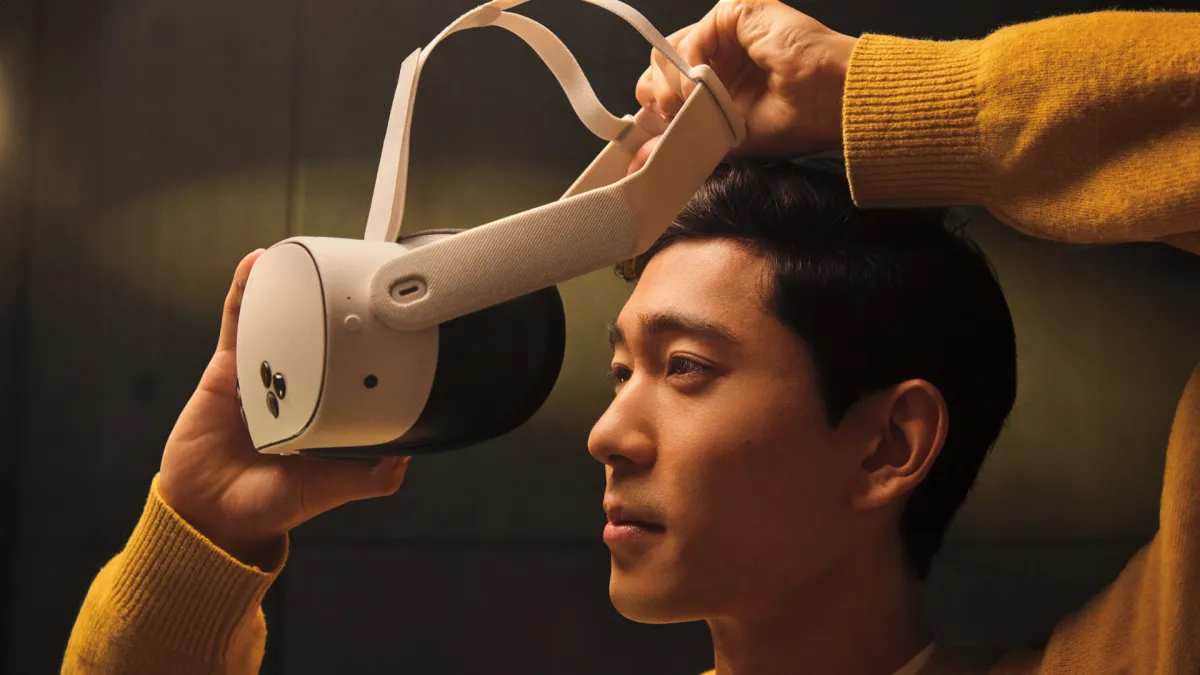2024's Year in tech
The year that augmented reality and artificial intelligence broke out.

2024 was a monumental year because it’s the year that iPhones finally felt boring for me.
Even as they improved a lot with the iPhone 16 and iPhone 16 Pro. iPhone hardware has never been better – I got a 16 Pro in September, and I’ve noticed considerable improvements in camera quality and battery life. And the titanium design feels great in the hand.
But so much is happening elsewhere, in the non-Apple consumer technology universe. Meta and OpenAI have both shipped a bunch of products that've made me very excited for what's to come.
Today, let’s have a look at the big tech themes from 2024 that got me excited.
Meta became a proper contender in consumer hardware
Before 2024, I’d never bought anything from Meta.
I’ve used lots of their products for years: Facebook, WhatsApp and Instagram. And I’ve been a keen Threads user since it launched. Meta has had been a persistent presence in my life for years through its polished software products that live on the web.
Here’s the thing, though – I’ve never paid Meta directly. Because I’ve been the product that makes them enough money to make them one of the richest companies in the world.
And so have you, probably. Meta’s money moat is built by products that keep us engaged and serve us relevant ads. And they have become so, so good at this, even as Apple shut off its ability to deterministically track ad conversion with App Tracking Transparency in 2021.
The company is so profitable that it, for years, has paid billions to its Reality Labs division to develop augmented reality and artificial intelligence innovations. And I think 2024 was the year that we started to see the shoots of this investment beginning to pay off.
Meta is an excellent product company.
We know they build incredibly engaging social software products, but this year they’ve proven they’re building a great hardware muscle too. We saw an impressive product launch: the Meta Quest 3S, a more affordable version of its Quest 3 headset.
And we saw the Ray Ban Meta sunglasses, which have been around for longer, reach a new peak of popularity as Meta added and improved the AI smarts contained in the glasses.
This year also brought us a demo of Orion: true augmented reality glasses that are so clearly the future of computing. They’re not slated to release for years, but it was a smart move by Meta to show them now, as it made us all think they’re winning the race for the next computing paradigm, even as Apple actually shipped one of the most compelling products I’ve ever seen (more on this later, though).
In 2024, I bought two Meta AR devices.
I wrote earlier in the year about my experiences using the Ray Ban Meta sunglasses – I wasn’t expecting to enjoy using them nearly as much as I did. This was product number one.
On Black Friday, I spotted that I could buy the Meta Quest 3S for a ridiculously priced £275. A steal to get spatial computing for under £300. This was product number two.
Like the Ray Ban Meta glasses, I wasn’t expecting to love the Quest 3S. I thought it might be janky and not perfect. And that’s true. It isn’t perfect. But I do love it. I’m writing this newsletter right now, Quest on face, sat at a desk overlooking a mountain and looking at a giant screen projecting my MacBook into the air.
Is the Apple Vision Pro better? Yes it is. The clarity of the screens in the Vision Pro, hand tracking and immersive experiences are all superior. But it comes with trade offs, mainly the price. The Quest 3S comes with trade offs too. But I’m willing to take those trade offs when I paid 8% the price of the Vision Pro.
So 2024 was the year that Meta became a company I buy tech products from. And they excited me more than Apple did this year, too.
Apple faltered, a little bit
Apple Intelligence
I’ve never bought into “Apple is doomed!” narratives. And to be very clear, I really don’t believe this to be true now, and it won't be for a very, very long time.
The company is arguably in its strongest position ever: it’s about to become the world’s first $4 trillion company. My new iPhone 16 Pro is impressive in battery life and camera quality, and I love the new titanium design. The Mac is the best computer you can buy. The Apple Watch has genuinely made me a much healthier person.
But… this year was the first year I felt the shine come off, ever so slightly. Apple has always been incredibly confident in its communications. And rightly so: they build great things that back up their confident comms. But in 2024, Apple started to feel… a bit lost?
It's because Apple Intelligence is messy. Apple felt the need to show that it has an AI story, but it rushed that story out.
Apple Intelligence is the key selling pointing their iPhone season advertising this year, even as the iPhone launched without it. And although some of the features I've found to be fun (I cannot stop making emojis of my friends, thanks to Genmoji), it doesn't feel like the game-changer Apple's touting it to be, yet.
Vision Pro
The Vision Pro is an astounding device. My first time using it was magical.
I loved it. But still, it felt like the Vision Pro was a miss this year.
I think this was a failure to control the narrative. Close watchers like me know Apple never really intended the device to be mass market. They priced it high to signal it wasn't supposed to be a device for everyone, but the general public took this as a sign of arrogance from the now-famed iPhone maker, I think. A better strategy would have been to make the Vision Pro a "developer kit", and focused this first year on making sure people were building things for it. This, though, didn't happen.
I also think they genuinely didn’t see Meta coming with their alternative, and more exciting and accessible narrative for augmented reality with less polished and more affordable products for enthusiasts to dabble with.
Meta is winning the narrative battle here, and narratives shape perception, which shapes outcomes. From talent wanting to work on something exciting through to customers getting exciting about the cutting edge, Apple needs to be sure it’s not positioned as the Goliath to Meta’s David.
Course correction
Apple are the kings of course correction and I think they’ll figure these challenges out. They’re clearly going to bring out a cheaper Apple Vision that is genuinely interesting to more people at a better price point. They’ll be collecting a lot of research and data on Apple Intelligence, and we’ll see how the personal context angle lands later this year, where you’ll supposedly be able to ask Siri anything about your messages, emails, photos, contacts and apps.
This was a faltered year from Apple and a stellar one from Meta. But Apple won’t feel threatened.
Institutionally, I think, Apple believes still that they are the underdog. They’re not anymore. And the sooner they realise that, the sooner they’ll be fighting fit against Meta.
We started building products around AI
Earlier in the year, I wrote about the trend of incumbent tech companies stuffing AI experiences awkwardly into existing products and challenger companies fumbling around trying to make AI happen without thinking much about usability or product design.
Well, I’m pleased to see that companies are now taking productisation seriously when it comes to AI. No one has done this better than OpenAI with ChatGPT.
What started as a research preview on the web in 2022 has become a seriously useful and incredibly easy to use app, that feels really native to the platform you’re using it on. And they’re continuing to pack it with new features without it feeling cluttered or forced.
In this year alone, we got big upgrades to the iOS app and a new Mac app. We got Advanced Voice Mode, which is genuinely magical. And recently, ChatGPT search, which is supposed to compete with Google.
Of course, the AI backend of ChatGPT is impressive, but the key driver of adoption for me was how OpenAI built incredibly usable products.
Making a spotlight-like interface complete with keyboard shortcut for the Mac (Option + Space if you haven’t stumbled across it yet) is genius and I use it all the time. My new iPhone’s action button is helpful too – I’ve mapped it to open Advanced Voice Mode.
Meta also deserves honourable praise here: using Meta AI in the Ray Ban Meta glasses was very, very cool. It felt almost as though this was the glasses’ key feature – being able to have a natural conversation with a computer with no need to look at a screen felt very well thought through indeed.
I expect this trend to continue into 2025. I’m hoping Anthropic catches up with OpenAI’s far superior app, as I hear they have a better AI model.
And I hope that incumbents, both big ones like Apple (who, I think, may have had a false start with Apple Intelligence) and smaller apps like my beloved ex-employer Monzo, create genuinely great user experiences first, which are powered by AI’s smarts.
And I started building workflows around AI
Questions and answers
2024 was the year that I started using ChatGPT as a default question machine – a profound shift, actually, from my whole life using the internet. Google has always obviously been my please-answer-my-question tool, as it has for pretty much everyone on the internet.
But this year, I noticed that I’d start with ChatGPT more. Having it on my Mac under Option + Space means it’s actually quicker, and especially since it’s started providing sources to some answers (especially if you ask it to “search the web” for your answer), it’s made it easier for ChatGPT to be a search engine.
I’m still using Google, but less than I was. It’s the first time in my thirty years on this planet where Google hasn’t always been my default question/answer machine.
Getting things done quicker
I’ve automated a lot of processes at work and in my life this year. One of my go-to tasks for ChatGPT is to create tables out of raw information to format it better. Or to create templates or frameworks. Marketers need frameworks and planning documents, and if you ask the right questions and provide plenty of context, you can save yourself a lot of time.
Here’s the key: AI tools should not replace your work. But they can augment tremendously well. I do the thinking, I ask ChatGPT to do the grunt work. Here’s a few examples:
- Telling ChatGPT about how I like to set up go-to-market plans and then asking it to lay it out as a template (which I then use as a starting point for when I’m building templates into Notion)
- Sharing raw research with ChatGPT, giving it my initial findings and hypotheses and asking it to turn that into a structured document based on how I’d like to prioritise the information
- Giving ChatGPT some raw principles for a policy document and asking it to write it up into a table in a clear way
Checking my work and giving feedback
I write strategy documents, research papers, marketing plans, creative briefs and development plans as part of my job. Now, before I share with my team, I have a good back-and-forth with ChatGPT.
I’ll often give it context on the document: who it’s for, why I wrote it, what our plans are, how our tone of voice and brand creative works, and ask for specific feedback: how’s the tone? Am I saying what I want to say? Is there anything obvious I’ve missed? Does my research support my hypotheses?
I say back-and-forth because that really is what it is: ChatGPT will make some suggestions, I’ll make some tweaks and share those. It’s not like copy/pasting search results on the internet but rather it’s having a conversation with someone who understands you and you brainstorm until you get somewhere you really like. It’s been genuinely very helpful.
Navigating life
This is a recent one, but it’s very cool. In Advanced Voice Mode, you can now share your camera, live, and talk with ChatGPT about what you can both see. It’s remarkable for things you don’t know how to do. My favourite example: when I asked it to walk me through making the perfect coffee.
For life stuff, I generally use Advance Voice Mode, because it feels like asking a wise friend for advice. And the conversation feels super natural, too.
So, that was the year.
2024 was the most exciting year in technology in ages. As the mobile era (iPhone, Android, iPad, Watches, AirPods) reaches a saturation point, where phones can only get so thin and screens can only get so bright, we’re finally reaching a point where new consumer technologies are moving into the zeitgeist.
Augmented reality from Meta, Apple and others is the shift I’m most excited about. It is really, really cool to have 100ft app windows floating around you or to be sitting in a movie theatre you’re not actually in. These experiences are getting better and better, and I think we’ll see more of this in 2025. I am so excited to see where Apple actually takes Vision. And how Meta builds on its early lead.
In what is the most obvious pronouncement ever: AI, too, will continue to change how we interact with technology incredibly rapidly. Here, I think more and more “traditional” user interfaces will disappear, in favour of text boxes and voice interaction. Computers are going to look very different indeed in the coming years, and 2025 will be a big year for establishing the big players. How will Google, Meta and OpenAI continue to productise AI? I think this will be the year that makes large language models useful to everyday people, and I can’t wait to see how that manifests.
We’re living in the future folks. It’s happening around us, right now.
Have a happy, healthy 2025, and I’ll see you in your inbox again soon.





